Inaugural Chester Pierce Symposium: Well-being in the Face of Adversity
On November 12, 2024, the inaugural Chester Pierce Symposium was held, bringing together leading voices from academia, business, and activism to explore the theme “Well-being in the Face of Adversity.” This event honored the legacy of Dr. Chester Pierce, a pioneer in psychiatry, civil rights, and social justice.
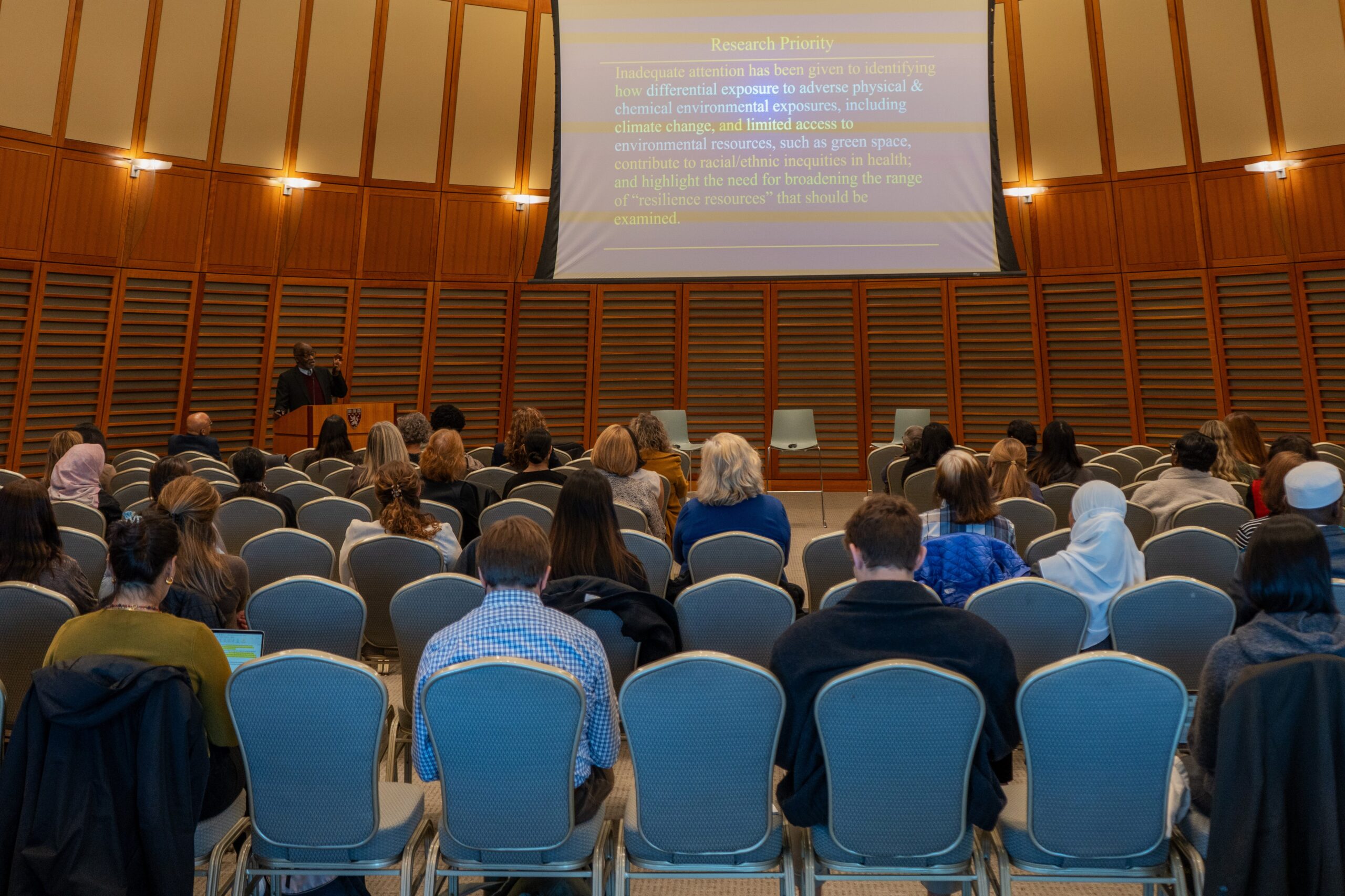
Pierce was the first African American to graduate from the Massachusetts General Hospital Psychiatry Residency Program. He later became a professor of psychiatry at Harvard Medical School and of education at Harvard University, serving as the chief of psychiatry at Massachusetts General Hospital and as a psychiatrist at MIT for nearly 25 years. Pierce also served on the faculty of the Harvard T.H. Chan School of Public Health, educating for 14 years in the Department of Health and Social Behavior, today called the Department of Social and Behavioral Sciences (the home department of the Lee Kum Sheung Center). The Chester Pierce Symposium is envisioned as an annual gathering to confront timely and critical issues. The 2024 theme, “Well-being in the Face of Adversity,” was selected to address growing societal challenges, including systemic racism, political polarization, and environmental crises.
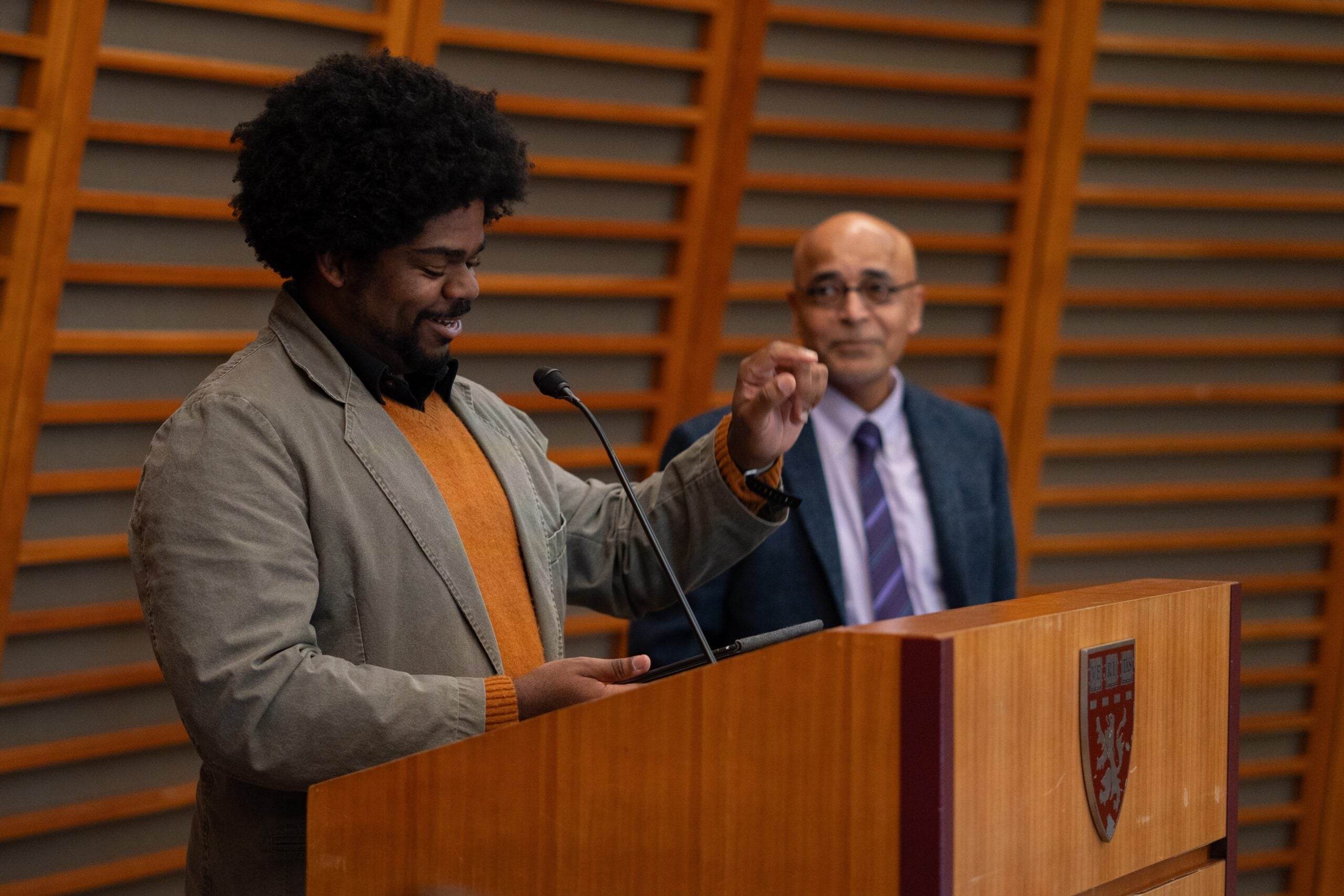
The day’s structure included a keynote lecture and three dynamic panel discussions. Speakers were introduced by Emry Ray Breedlove, Harvard Chan School MPH ’24 (pictured right, alongside Center Director Dr. K. “Vish” Viswanath). Opening remarks were given by Dean Jane Kim, followed by an introduction by Director Viswanath, who announced,
Today is about empowerment, what we can do as a society to foster resilience. We want to go beyond individuals and focus on larger systems, larger conditions in understanding and fostering resilience.
Keynote Lecture: Racism and Health – Understanding Its Threats, Mobilizing Defenses
Following Director Viswanath’s remarks, Dr. David Williams delivered a powerful keynote lecture exploring the intersection of racism and health. Williams serves as the Florence Sprague Norman and Laura Smart Norman Professor of Public Health in the Department of Social and Behavioral Sciences at the Harvard Chan School, as well as Professor of African and African American Studies in the Faculty of Arts and Sciences.
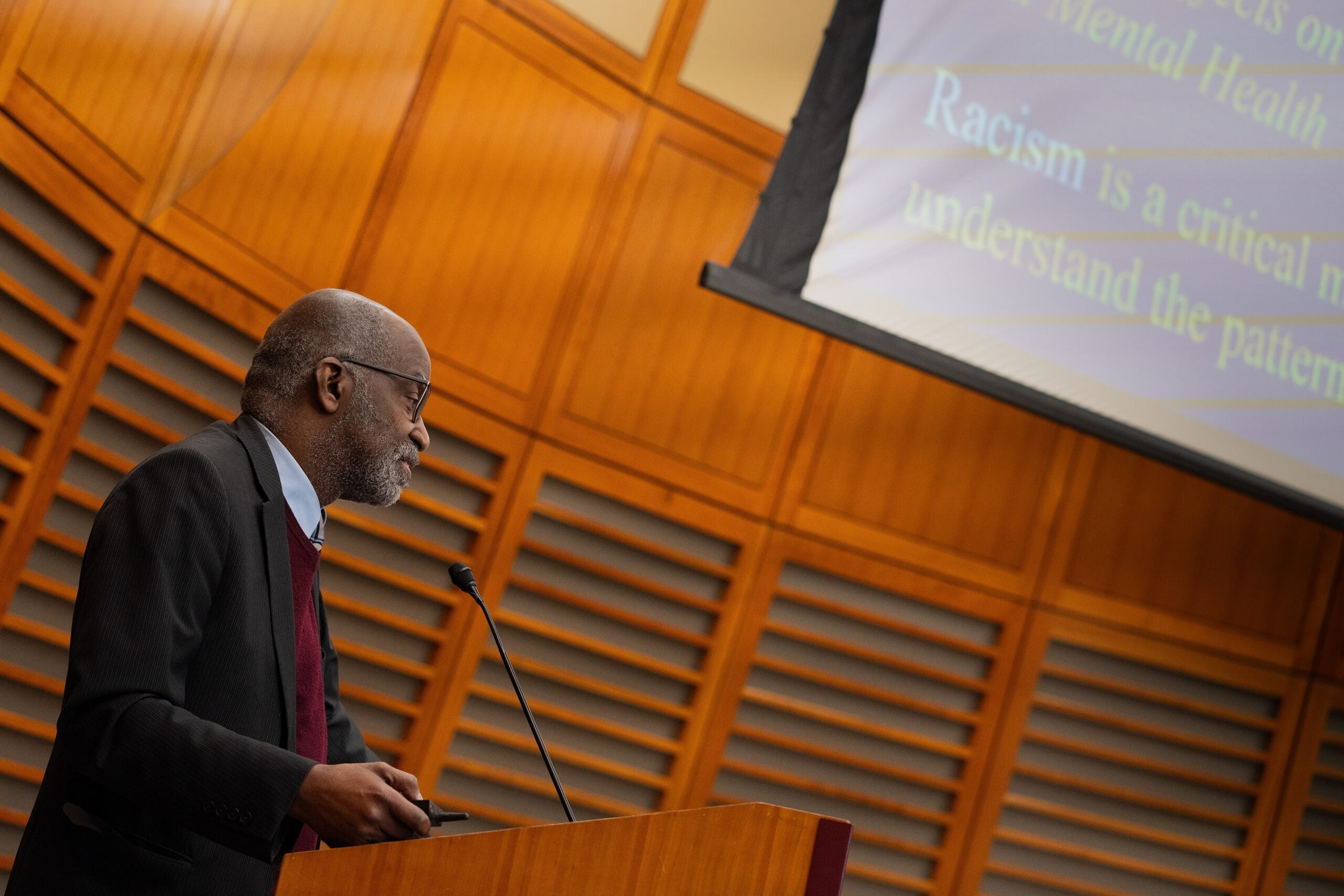
Williams highlighted the stark realities of racial health inequities in the US, underscoring the message with two shocking statistics: 203 Black people die prematurely in the US every day due to racial health inequities; and Black children are 3x more likely to lose their mother by age 10. Williams pointed to socio-economic factors, systemic segregation, and pervasive racism as the root causes of these inequities, leading to significant differences in neighborhood resources, healthcare access, and financial stability between Black and White communities. Despite increasing awareness and civil rights activism, he noted that income disparities and life expectancy gaps between Black and White Americans have remained consistent over the last several decades. Williams referenced Pierce, who introduced the concept of microaggressions. Williams defined them in the context of racism as “assaults to black dignity [that] are incessant and cumulative.” This everyday discrimination is linked to mental and physical health issues, including but not limited to high blood pressure, poor sleep, and elevated suicide risk. Williams proposed a multifaceted approach to address these profound inequities, beginning by raising awareness.
Most Americans, data reveals, do not know that inequities in health exist. So we need to raise awareness levels. We need to develop political will. And we need to build empathy.
He emphasized the need for educational strategies aimed at reducing prejudice and raising awareness, which are vital in changing public perceptions and behaviors. He argued for the necessity of creating “communities of opportunity” by reducing childhood poverty, enhancing income and employment opportunities, and improving neighborhood and housing conditions. He suggested that building trust between patients and healthcare providers by diversifying the workforce, particularly by increasing the presence of Black doctors, can improve healthcare experiences and outcomes for Black patients. Williams concluded by referencing a quote from Robert F. Kennedy, stating, “It is my hope that each one of us today resolve that going forward we will be a tiny ripple of hope. Together, we can sweep down the mighty walls of oppression and resistance.”
Panel 1: Resilience in Times of Adversity: Institutions, Individuals, and Community Strength
The first panel asked the question, “How can individuals, institutions, and communities foster resilience amidst challenges like social tensions and systemic discrimination?” The session was moderated by Dr. Brittney Francis, a research scientist at the FXB Center for Health and Human Rights at the Harvard Chan School, and featured Dr. Nancy Michael, Director of Education and Co-Director of the Neuroscience and Behavior major at the University of Notre Dame, and Julia Hotz, journalist and author of The Connection Cure: The Prescriptive Power of Movement, Nature, Art, Service, and Belonging.
In the discussion, Michael explained that on a physiological level, resilience is the body’s ability to flexibly recover and reinstate autonomic balance after stress, involving nervous and endocrine system interactions. She argued that resilience should be about “bouncing forward” rather than just returning to one’s previous state, highlighting how social support and resources can help individuals not only recover from adversity but also grow and improve beyond their past selves. She emphasized the importance of translating science to the public, arguing that “Knowledge doesn’t change anything unless we’re enacting it in some way.” Michael puts this principle into action with her work at the Self-Healing Communities of Michiana nonprofit, using community education on neuroscience to address and treat trauma.
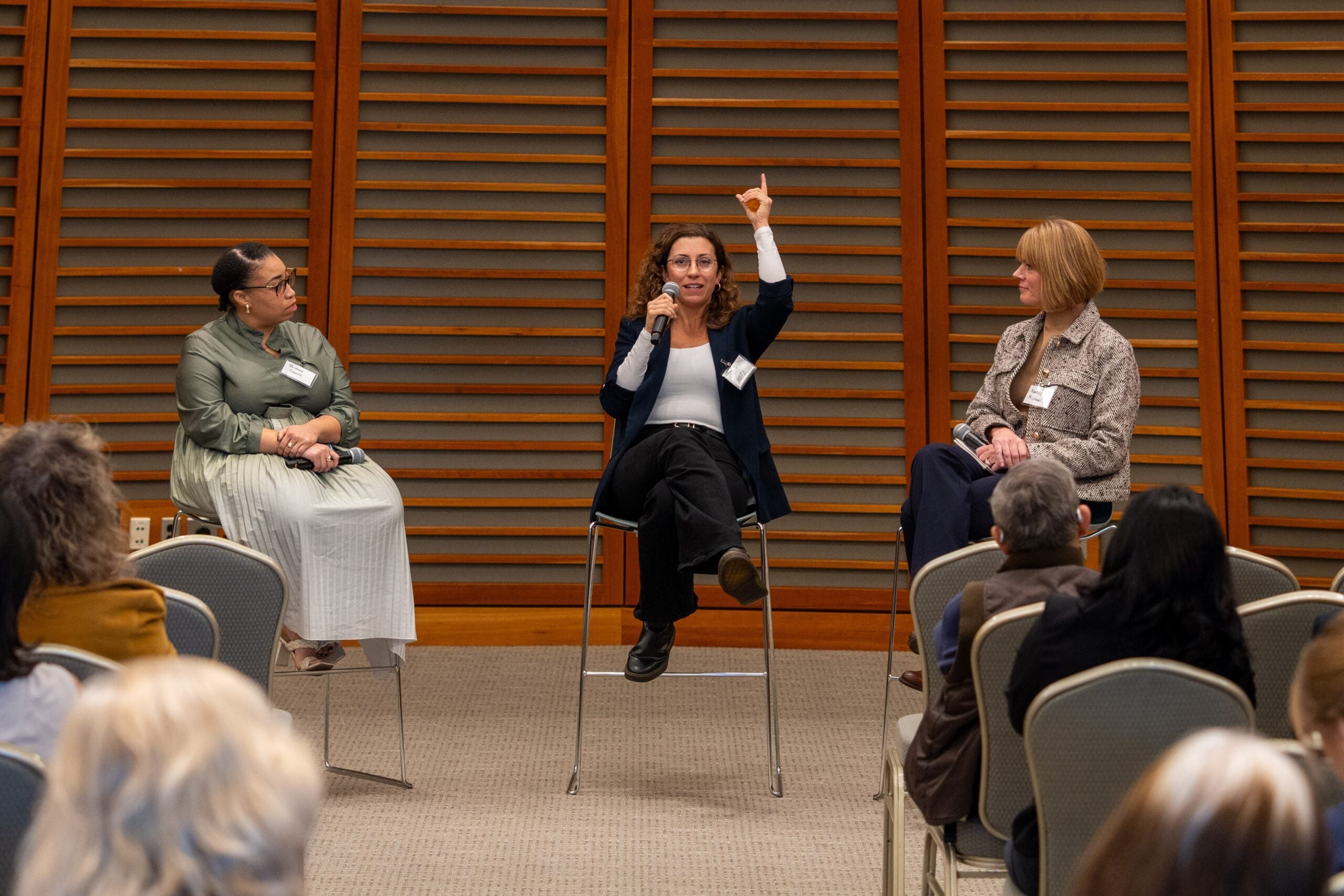
Hotz explained that resilience should be understood as a community-driven process, arguing that “If the stressor is social in nature, the medicine should be too.” She went on to introduce the concept of social prescribing, which involves recommending community engagement activities as part of medical treatment to combat social isolation and improve community health. “There are five types of social prescription,” Hotz explained. “My book focuses on movement, nature, art, service, and belonging, because we evolved to sort of spend our time in these ways.” She argued that health insurance companies should cover social prescriptions, suggesting that investing in community activities for policyholders could ultimately save these companies money. For instance, she pointed to Massachusetts, which recently introduced the nation’s first statewide arts prescription solution. This initiative involves over 300 arts and cultural partners working alongside hospitals and insurers. Both panelists emphasized the importance of social interactions in improving health outcomes and fostering resilience.
Panel 2: Flourishing Amidst Climate Change: Promoting Well-Being and Social Justice
The second panel asked the question, “How can communities promote well-being and social justice amidst the challenges of global climate change?” The session was moderated by Dr. Christie Denckla, Assistant Professor of Social and Behavioral Sciences at the Harvard Chan School, and featured Dr. Elizabeth Pinsky, psychiatrist, pediatrician, and Associate Director for Advocacy at the Massachusetts General Hospital Center for Environment and Health, and Heather White, founder of the nonprofit One Green Thing and author of books such as Eco-Anxiety: Saving Our Sanity, Our Kids, and Our Future.
Both Pinsky and White discussed eco-anxiety and its complex relationships with climate change. Pinsky emphasized that, rather than being a pathology, eco-anxiety is a legitimate response to environmental issues, stating,
Anxiety is adaptive. It is what we need to identify an oncoming threat and respond to it… And in the case of eco-anxiety, it’s more than just a necessary emotion. I would argue that it’s a moral one.
Pinsky explained how this anxiety can spur collective action and social connection, vital for coping with climate-related stress. Pinsky then discussed the link between climate change and inequity, beginning with the observation that “the countries that burn the most fossil fuels are not the countries that are experiencing the greatest impact.” This inequity spans generations, with future generations bearing the consequences of today’s actions, and is also deeply racial. Emphasizing this point, she stated that “climate change is racism manifested,” and highlighted environmental Hop Hopkins’ insight: “You can’t have climate change without sacrificing. You can’t have sacrifice zones without disposable people. You can’t have disposable people without racism.” Furthermore, she pointed out that climate change worsens existing inequities in infrastructure, heat, and air quality, functioning as a “threat multiplier.”
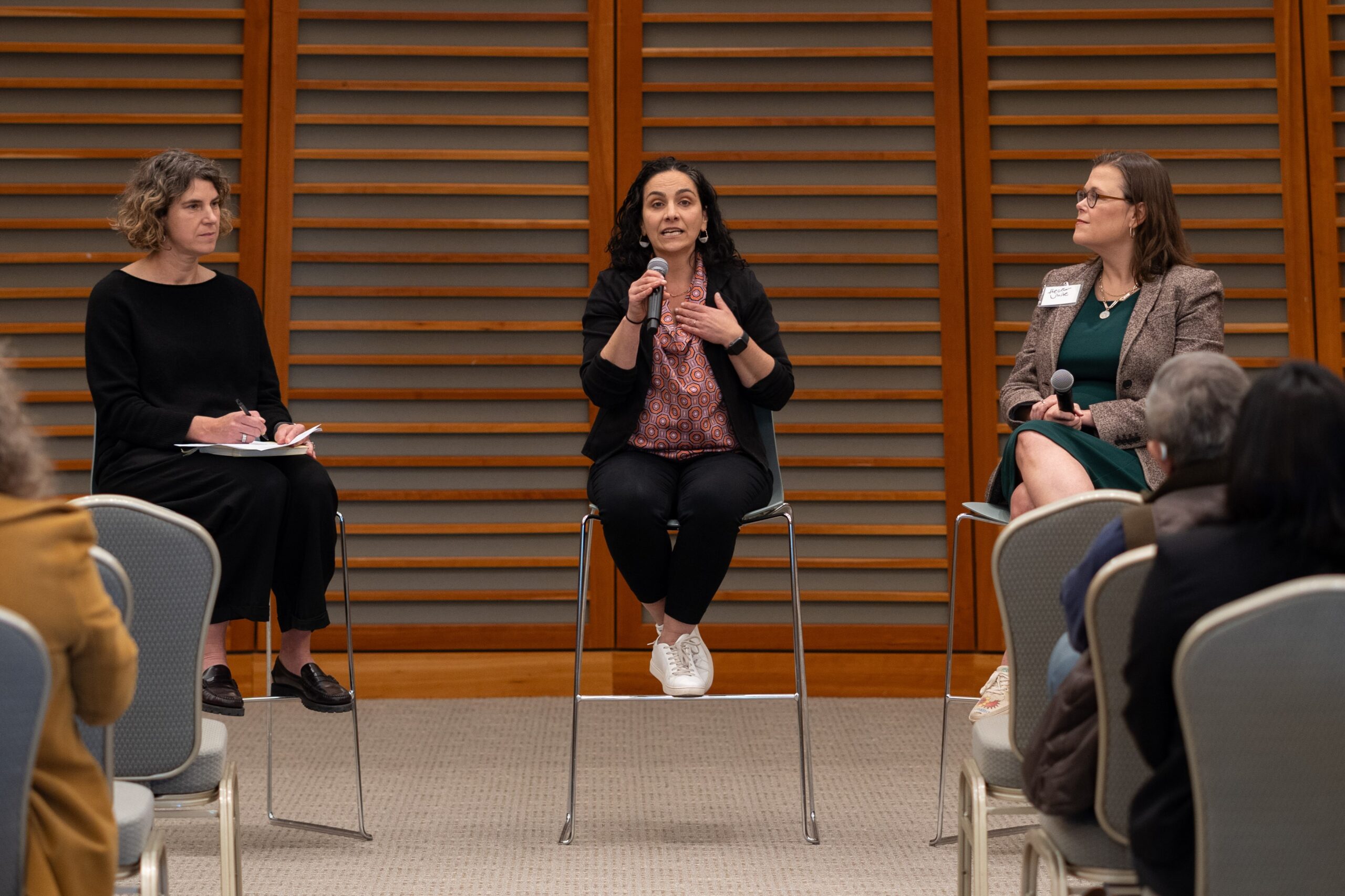
White reiterated Pinsky’s point about the intergenerational inequity of climate change, referencing a study by Lewandowski, et al. (2024), stating: “Of 16,000 young people in the United States, 85% experience eco anxiety, and more than half do not want children of their own because of climate change.” She went on to explain that most carbon pollution has occurred since 1990, and highlighted that younger generations, including her own descendants, will face greater climate challenges than she has, concluding that “that is an intergenerational call to action for all of us.”
But how can we make a difference when the problem seems so overwhelming? As White explained, “sometimes the burden of individual action can be a barrier to systemic or collective action.” The best way to combat this issue, she argues, is by giving people a sense of agency, and connecting their activism with their identity. To this end, she created the “Service Superpower Assessment“, an online quiz which sorts takers into seven archetypes, highlighting their unique strengths and giving them recommendations on how to take action and act as “culture change agents” in their communities and families. She concluded with a call to action, asking:
Who are you? How can you be involved in the climate movement, which is the biggest challenge of our lifetime? Everyone is welcome. Everyone is needed.
Panel 3: Happy in the Workplace: Cultivating Positive Work Experiences through Innovation and Leadership
The third and final panel asked the question, “What policies can managers implement to create and maintain a healthy, happy workplace?” The session was moderated by Dr. Erika Sabbath, Associate Professor at Boston College School of Social Work and Co-director of the Harvard Center for Work, Health, and Wellbeing. It featured Dr. Glorian Sorensen, Research Professor of Social and Behavioral Sciences at the Harvard Chan School and Founding Director for the Harvard Center for Work, Health and Well-being, as well as Jonathan Isaacson, Chairman and CEO of The Gem Group.
Sorensen began by emphasizing the potential of work to be a significant source of happiness, purpose, and well-being. She defined “thriving from work” as a state where employees can reach their full potential across work, home, and community life.
Both panelists discussed the rising concern about mental health problems in the workforce. Sorensen cited the 2022 US Surgeon General’s Framework for Workplace Mental Health and Well-being, sharing that, “76% of workers currently report at least one mental health symptom. 84% report working conditions that contribute to poor mental health. And 81% report they’re looking for jobs that would support their well-being.” Isaacson contributed his own first-hand perspective as an employer, stating that, “We’re seeing more issues around mental health than we’ve ever seen before.” He also drew attention to the profound impact of the pandemic on work dynamics, blurring the lines between home and work and exacerbating mental health challenges such as loneliness and burnout.
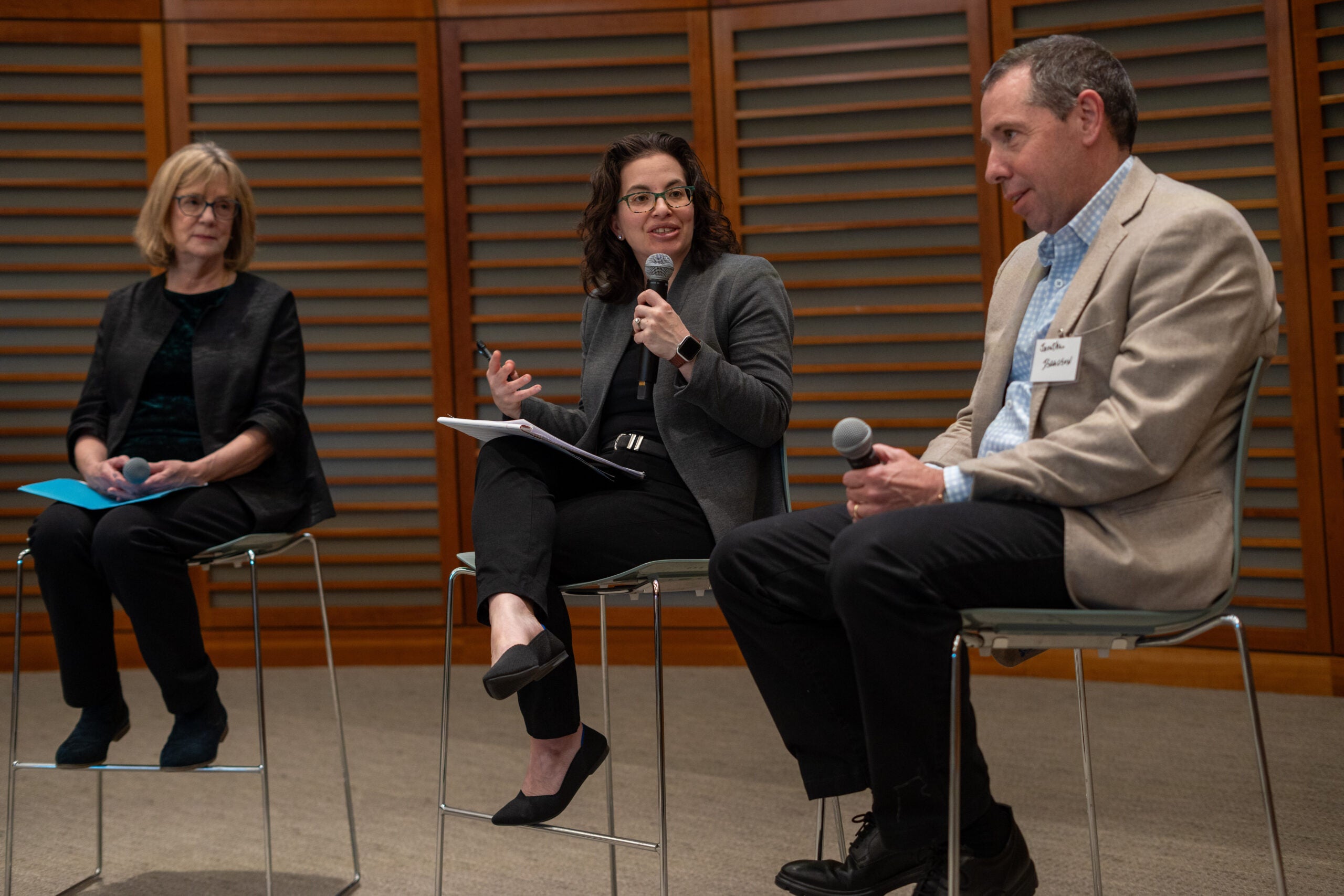
To combat this increasing isolation, Isaacson employs every strategy he can to ensure that his employees thrive. “Larry Summers once said that in the history of humanity nobody ever washed a rented car,” he explained, “and so one of our goals is to make sure that our employees don’t feel like they’re working in the equivalent of a rented car. And the only way to do that is to give people agency.” Isaacson also works hard to cultivate a sense of pride and community within the company, and to build trust between himself and his employees by getting to know them personally. Sorensen argued that this sort of effective leadership is essential in mitigating stress and enhancing workplace culture, directly influencing workers’ mental health and overall job satisfaction. However, she also emphasized the necessity of societal-level changes, such as raising the minimum wage and fostering communal well-being, to address these issues.
Through discussions on mental health, systemic racism, climate challenges, and workplace dynamics, the first Chester Pierce Symposium underscored the importance of collective action and effective leadership. By drawing on diverse voices and experiences, the event fostered a holistic approach to tackling pressing societal issues, aiming to inspire resilient, equitable, and thriving communities. The lessons learned from this gathering echo Dr. Chester Pierce’s life-long commitment to justice and dignity, setting a precedent for future symposia to continue addressing the challenges of our time with empathy and collaboration.